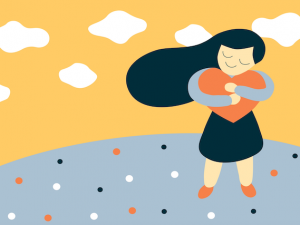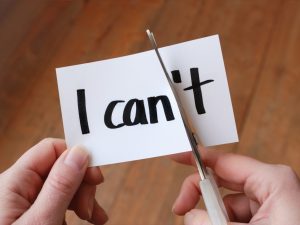Resilience needs one more step, which is precisely the step that María took. Because she not only overcame difficulties but transcended them and turned the illness of her son into the meaning of her life, into her purpose. Her involvement with her illness has been such that today the photo of her son is the symbol of the families that fight to publicize the Ondine Syndrome and obtain funds for it to be investigated.
Resilience implies action
More than overcoming an adverse situation, resilience has to do with the ability to grow with adversity, transcend it, and transform it into something positive. Resilience cannot, therefore, remain in the field of thought or intention.
Resilience needs a different look, indeed, but it also needs concrete actions. Resilient people are people who, in addition to accepting and integrating that an adverse event has occurred in their life, do something about that problematic situation that allows them to transform it into something positive.
Strengthening our resilience capacity
As I said at the beginning, resilience is the heritage of humanity. It is a capacity that we all have, but we do not all develop in the same way. Resilience needs training, and for most psychologists, there are a series of attitudes that we can work on, and that can help us develop it:
Cultivating emotional intelligence: learning to recognize, accept and manage the emotions we feel, which implies learning to identify their signals in our body and listen to them with curiosity.
Mindfulness: realizing what our automatic and reactive behavior patterns are in the face of things that happen.
Ask ourselves questions and set up a list of what other non-automatic actions or strategies we can carry out to reduce our discomfort.
Find the meaning and purpose of those conscious actions that we have put on the list.
Accept our vulnerability, allow ourselves to make mistakes, and assume that we all have the right to suffer.
They are habits that require a certain degree of self-inquiry. That is why in psychology, there is talk of training resilience. It is not something you have or you do not have: it is a challenging capacity to develop if you do not work through that introspection.
Resilience in times of coronavirus
When psychologists, opinion leaders, or some politicians like Angela Merkel tell us that we must face the coronavirus crisis with resilience, they do not mean that we must try to overcome this moment to return to normal as if nothing had happened.
Being resilient in times of coronavirus refers more to consciously cultivating, as individuals and as a society, that intention to transcend, transform and grow in adversity.
Being resilient in times of coronavirus refers to taking advantage of this situation in the most profound and most spiritual sense, not staying in the “I will resist” but to investigate, go a little further and realize what opportunities for change and transformation we have. is signaling this crisis. And of course, not stay in the sphere of thinking, but move as soon as possible when acting. Because without action, there is no resilience.
The practice of resilience: How can we be more resilient?
Resilience is not an innate quality; it is not imprinted in our genes, although there may be a genetic tendency predisposing us to have a “good character.” Resilience is something that we can all develop throughout life.
practical resilience
Some people are resilient because they have had a role model of resilience in their parents or someone close to them, while others have found their way independently. This tells us that we can all be resilient if we change some of our habits and beliefs.
Resilient people are not born; they are made, which means they have had to fight against adverse situations or have had the taste of failure several times and have not given up. Finding themselves on the edge of the abyss, they have given the best of themselves and have developed the necessary skills to face the different challenges of life.
Resilient people practice these habits:
They are aware of their potentialities and limitations. Self-knowledge is a potent weapon to face adversity and challenges, and resilient people know how to use it to their advantage. These people know what their main strengths and abilities are, as well as their limitations and shortcomings. In this way, more objective goals can be set that take into account your needs and dreams and the resources available to achieve them.
They are creative. The person with a high resilience capacity does not limit himself to glue the broken vase; he is aware that it will never be the same again. The resilient will make a mosaic with the broken pieces and transform his painful experience into something beautiful or valuable. Out of the vile, he brings out the precious.
They trust his abilities. By being aware of their potentialities and limitations, resilient people trust what they are capable of. If something characterizes them, they do not lose sight of their goals and feel confident of what they can achieve. However, they also recognize the importance of teamwork and do not withdraw into themselves but know when to ask for help.
They take difficulties as an opportunity to learn. We face many painful situations that demotivate us throughout life, but people with a high level of resilience can see beyond those moments and do not lose heart. These people see crises as an opportunity to generate change, to learn, and grow. They know that these moments will not last forever and that their future will depend on how they react. When faced with adversity, they ask themselves: what can I learn from this?
They practice mindfulness or mindfulness. Even without being aware of this ancient practice, resilient people have the habit of being fully present, living in the here and now, and having an excellent capacity for acceptance. For these people, the past is part of yesterday and is not a source of guilt and anxiety, while the future does not stun them with its share of uncertainty and worries. They can accept experiences as they are presented and try to get the most out of them. They enjoy the little details and have not lost their ability to marvel at life.
They view life objectively but always through an optimistic lens. Resilient people are very objective, they know their potentialities, the resources they have at their disposal, and their goals, but that does not imply that they are not optimistic. Realizing that nothing is positive or negative, they strive to focus on the positives and enjoy the challenges. These people develop a realistic optimism, also called Optimism, and they are convinced that no matter how dark their day is, the next day can be better.
They surround themselves with people who have a positive attitude. People who practice resilience know how to cultivate their friendships, which is why they generally surround themselves with people who maintain a positive attitude towards life and avoid those who behave like emotional vampires. In this way, they create a solid support network that can sustain them in the most challenging moments.
They do not try to control situations but their emotions. One of the primary sources of tension and stress is the desire to control all aspects of our lives. So when something slips out of our hands, we feel guilty and insecure. However, resilient people know that it is impossible to control all situations; they have learned to deal with uncertainty and are comfortable even if they are not in control. They focus on changing their emotions when they cannot change reality.
They are flexible in the face of changes. Although resilient people have an evident self-image and know precisely what they want to achieve, they also have enough flexibility to adapt their plans and change their goals when necessary. These people are not closed to change and are always willing to evaluate different alternatives without obsessively clinging to their initial plans or a single solution.
They are tenacious in their purposes. The fact that resilient people are flexible does not imply that they renounce their goals; on the contrary, if something distinguishes them, it is their perseverance and ability to fight. The difference is that they do not fight against windmills but take advantage of the current direction and flow with it. These people have an intrinsic motivation that helps them stand firm and fight for what they set out to do.
They face adversity with humor. One of the essential characteristics of resilient people is their sense of humor; they can laugh at adversity and pull a joke out of their misfortunes. Laughter is their best ally because it helps them stay optimistic and, above all, allows them to focus on the positive aspects of situations.
They seek help from others and social support. When resilient people go through a potentially traumatic event, their first objective is to overcome it. For this, they are aware of the importance of social support and do not hesitate to seek the help of a good psychologist when they need it.






























Add Comment